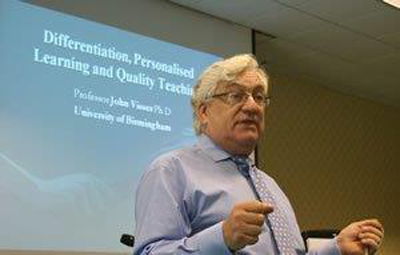
On Nov.4, the Office for Students with Disabilities will be host the 4th annual Rathlyn Lecture in Disability Studies: “How useful is it to be labelled ADHD in an inclusive educational system?” The lecture will be delivered by Professor John Visser, renowned UK scholar on Social, Emotional and Behaviour Difficulties, who will encourage us to examine the way we talk about and view ADHD.
Professor John Visser is Visiting Professor at the University of Northampton, having retired in 2010 from the University of Birmingham, where he was programme tutor for professional development courses in the area of social, emotional and behavioural difficulties at undergraduate, post graduate and doctoral levels. He is a consultant to schools, services and Local Authorities nationally and internationally in the area of special education. Recently Visser has been working in Norway, Denmark, Georgia and India on projects related to policies, practice and provision for children and young people with special educational needs in mainstream and specialist provision. He is widely known for his professionally relevant research and staff development work on classroom management; special educational needs, pupils with social, emotional and behavioural difficulties; teaching and learning, particularly differentiation
A founder of the National Association for Special Educational Needs, Visser served in a variety of national offices (including President) over a 25 year period, he also served as treasurer to the Association of Workers for Children with Emotional and Behavioural Difficulties and the European Association of Special Education.
How useful is it to be labelled ADHD in an inclusive educational system?; Nov. 4; 5:30 p.m. – 7 p.m.; Bronfman Building, Room 179. The OSD invites everyone for drinks and snacks at the OSD after lecture.
Why do you think ADHD creates such a controversy?
The labelling of a child or young person’s behaviours which an individual views as challenging in some manner reveals that individual’s values, beliefs about human nature and moral position on a number of variables which make up any given society. At this point the child or young person so labeled is perceived as being outside that individual’s perception of what is normal. The label is then taken by others as an objective measure which must have an identifiable common cause, thus an individual’s local difficulty becomes a personality disorder which requires medical diagnoses and medication. This process narrows the possibility of what ‘normal’ behaviours are, such that parents and professionals are in danger of losing sight of the diversity that is behaviour which contributes to the richness of Human existence. They are in pursuit of their version of what it is to be normal rather than accepting diversity in behaviour, they seek to highlight and make non-normal the differences in behaviours. ADHD has become part of that process, as parents and professionals seek a label for behaviours which are all too often within the bounds of normal even in statistical terms. I wonder if when I come to finally retire I will have seen in the words of Diller (2006)* ‘the last normal child as DSM V pushes us towards labelling every behaviour as a disorder.
The social model of Disabilities argues that the environment creates disabling situations. How appropriate do you think this vision is when it comes to ADHD?
It isn’t any more or less helpful than any model which attempts to reduce an understanding of behaviour to just one perspective. I am not convinced that there will ever come a time when we will be able to have a model which explains all behaviours in all circumstances and in all eras.
Your lecture will touch on ‘lessons for the future.’ Could you briefly highlight some of the concerns we should have as institution, education system or even society with the way students with ADHD are handled?
That we should watch out that our education systems at all levels do not continue to reduce learning opportunities by tailoring teaching or placement to particular difficulties, or if you will disorders. To do so will detract from treating individuals as individuals by tailoring teaching to their learning needs and personal aspirations. That way will not lead to greater inclusion of all people in a society. When faced with the child or young person labeled by others as having ADHD let’s look beyond the label to the human before us and work with that person to find ways of understanding how they can engage as learners to their benefit and the benefit of others.
As a professor having had a long career in Special Education and Social, Emotional and Behavioral Difficulties, what have been the best highlight and the biggest challenge in this field?
Grappling with the need to understand individual learning needs while administrative activity seems to require the ability to put those individuals into groups to deliver a service has been the biggest and remains a challenge for my professional life. The high points have been the progress made seeing others working children and young people not judging them by criteria such as class, IQ, colour, race, disability or even behaviour but rather by their individual needs and the desire to raise their aspirational horizons, though there is still some way to go before this is a universal approach.
• Diller, L. H. (2006) The Last Normal Child. London Praeger
